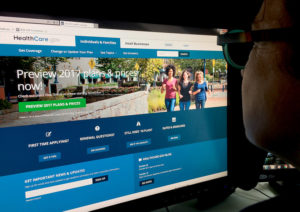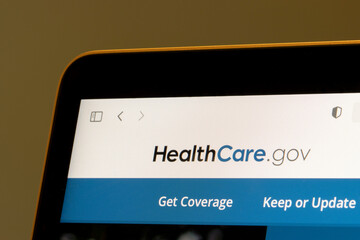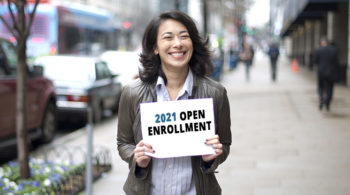Plenty of shopping options, plus lower prices.
That’s usually a winning formula for consumers.
And that scenario describes how Georgia’s health insurance exchange is shaping up for individuals and families looking for coverage in 2022, according to initial filings by health insurers to the state’s insurance department. The filings were obtained by GHN through an open records request.

Five insurers are proposing to enter the individual exchange for 2022, bringing the state’s total to 11. Three had dropped out in earlier years – Aetna, UnitedHealthcare and Cigna – and two are new entrants to the market, Bright Health and Friday Health Plan.
They would join holdovers Alliant, Ambetter, Blue Cross, CareSource, Kaiser Permanente and Oscar.
Eleven would be the most options for consumers to pick from since the exchange opened in 2014. Exchanges in the individual states were created by the Affordable Care Act, to allow people without health insurance from government programs or private employers to buy their own coverage at a reasonable rate.
“The rates look really good – obviously the market is really stable,’’ said Bill Custer, a health insurance expert who analyzed the insurer filings.
Part of the flat trend in premiums relates to the COVID-19 pandemic, Custer said. “A lot of people didn’t get care’’ during 2020 as the coronavirus spread, he said, which reduced the level of insurer payouts to medical providers.
There has been concern about pent-up demand for medical care leading to a surge in claims once the pandemic is over, Custer said. “Obviously insurers don’t think that it is a big issue,’’ he added.
Among the returning insurers, the highest increase in premiums proposed was Aetna’s 6.9 percent, the analysis by Custer shows. Alliant, Blue Cross, CareSource, Kaiser and Oscar all posted premium decreases.
Ambetter, with the largest number of Georgia exchange enrollees, proposed just a 0.6 percent increase, Custer showed. Run by St. Louis-based insurance giant Centene, Ambetter is the only health plan that would be offered statewide next year.
Rates are not final until state regulators, and then federal officials, approve them, and those decisions are scheduled for September.
Meanwhile, insurance agents warn consumers that the cheapest health plans may not have the most robust networks of hospitals and doctors.
Changes for this year
Enrollment in the exchanges is normally concluded before the coverage year begins. But enrollment for 2021 is still open for new customers until Aug. 15, under an extended enrollment period approved by the Biden administration because of the economic effects of the pandemic. During this special enrollment period, Georgia has seen at least 70,000 more enrollees enter the exchange than in previous years, federal data show.
“These numbers show what we’ve long known to be true: People both need and demand affordable health coverage in Georgia,” said Xavier Becerra, the U.S. Health and Human Services secretary, in a recent statement.

Depending on income, policies available on exchanges offer discounts, known as subsidies, for consumers. Under the American Rescue Plan implemented by President Biden, subsidy changes are allowing Georgians already enrolled in 2021 coverage to save even more money, an average of $59 per month, according to the federal Centers for Medicare & Medicaid Services.
Patrick, 33, who lives in metro Atlanta, said that he will soon get a premium decrease of about $100 a month thanks to the new subsidy hike. Patrick, who owns a company in the entertainment industry, requested that his full name not be used.
The exchange, he said, “has given me some good options and not some garbage catastrophic plans’’ that don’t cover much care.
Those extra discounts will continue through next year.
More than 500,000 Georgians are enrolled in exchange coverage this year.
A better bargain than elsewhere?
Nationally, proposed 2022 premiums reviewed by Kaiser Family Foundation (KFF) show the rate hikes of 13 other states are generally higher than Georgia’s, which were not analyzed by KFF.
Most insurers expect health utilization patterns to return to pre-pandemic levels, and thus most are not factoring in any additional costs or savings related to COVID-19 in their 2022 premiums, the KFF analysis said.

The extra subsidies, and new help for those with incomes of above 400 percent of poverty, are expected to increase the number of enrollees in the individual market, the analysis said. Some insurers predict these new enrollees may be healthier and thus financially less risky to insure than current members.
Premiums for individual policies on California’s health insurance exchange will go up 1.8 percent on average next year — a small increase credited to record enrollment and increased competition among health carriers, officials in the state reported recently.
A more optimistic scenario
The Georgia exchange has emerged from some rockier past years, when premiums spiked and some insurers dropped out.
The four additional insurers show they see the exchange as a profitable area, Custer said. “They can assess the risk and price accordingly.’’
One of the new entrants, Friday Health Plans, said it’s looking forward to bringing affordable and quality health plans to Georgia residents in 2022.
“We are currently working with regulators to obtain our final licensing agreements in the state,’’ said Sal Gentile, CEO of the Denver-based company. “High uninsured numbers have plagued the Peach State in recent years, which is especially concerning in the wake of the pandemic.’’ The company says it features unlimited, free primary care visits.
The increased competition shows more certainty from insurers about the stability and viability of the health insurance exchange, said Laura Colbert of the consumer group Georgians for a Healthy Future.

She noted that many uninsured Georgians are eligible for discounted exchange policies with premiums that are less than $50 and in some cases as low as zero, but that these people are often unaware that such deals are available.
The proposed 2022 premiums in Georgia are going through the government review process even as federal health officials are balking at Gov. Brian Kemp’s waiver plan to replace healthcare.gov with a privately run enrollment system. (Waivers, which require federal approval, are state changes to certain health programs.)
Another facet of the waiver plan that’s being debated, and has received a more favorable reception from the feds, would create a reinsurance program for Georgia. That could lower premiums on the exchange even further.
Tips for consumers
Before shopping, consumers should study the networks of providers that the health plans are offering, said Bill Lucas, an insurance agent in the Savannah area. Some insurers offer much better networks of doctors and hospitals to employers than they provide for individual coverage, he added.

With a week remaining to sign up for coverage this year, federal officials note that consumers:
** Can use healthcare.gov to apply online.
** Call the Marketplace Call Center at 1-800-318-2596, which provides assistance in over 200 languages.
** Find local help through an agent/broker or assister in your area at Healthcare.gov/find-assistance/.

